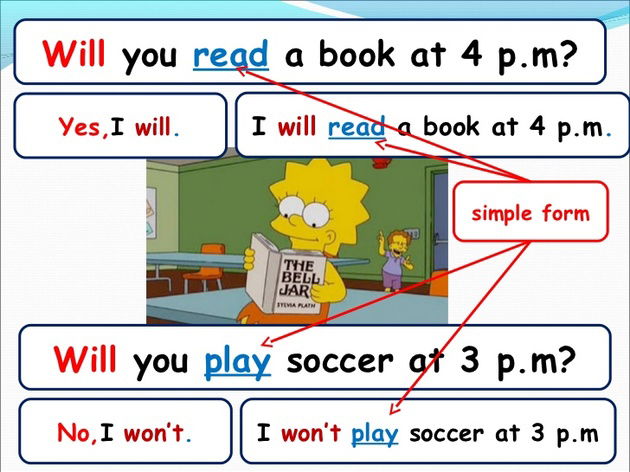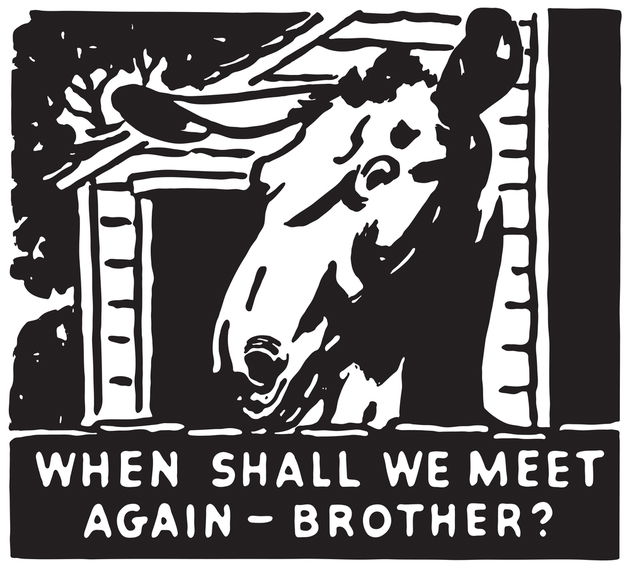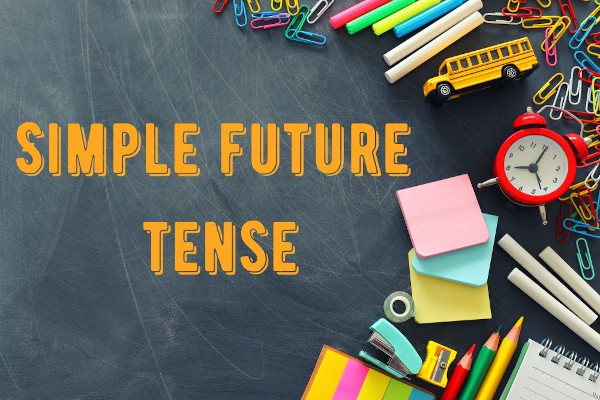O Simple Future (Futuro Simples), também chamado de Future Simple, é um tempo verbal usado para expressar ações futuras que irão ocorrer, ou seja, que ainda não aconteceram.
O Simple Future Tense pode indicar uma decisão que está sendo tomada no ato da fala. Além disso, pode expressar um pedido, uma promessa, um aviso, um convite ou uma oferta.
Em português, esse tempo verbal corresponde ao Futuro do Presente do Modo Indicativo.
Na formação dos tempos futuros em inglês é comum utilizarmos os verbos modais auxiliares will e shall e a estrutura going to.
Futuro com will
Geralmente, usamos o will para indicar uma ideia de futuro que pode expressar incerteza ou ser decidida no momento da fala.
Regras de formação e exemplos
Affirmative form
A formação de frases de futuro com will na forma afirmativa segue a seguinte estrutura:
Sujeito + will + verbo principal no infinitivo sem o to + complemento
Exemplos:
- They will buy a new house. (Eles comprarão uma casa nova.)
- We will go out tonight. (Nós sairemos hoje à noite.)
A forma afirmativa também pode ser utilizada na forma contraída após pronomes pessoais. Para isso, basta usar ‘ll no lugar de will.
Exemplos:
- I will visit my cousin tomorrow. = I’ll visit my cousin tomorrow. (Visitarei minha prima amanhã.)
- They will arrive at night. = They’ll arrive at night. (Eles chegarão de noite.)
Negative form
A formação de frases de futuro com will na forma negativa segue a seguinte estrutura:
Sujeito + will + not + verbo principal no infinitivo sem o to + complemento
Exemplos:
- They will not buy a new house. (Eles não comprarão uma casa nova.)
- We will not go out tonight. (Nós não sairemos hoje à noite.)

A forma negativa também pode ser utilizada na forma contraída. Para isso, basta usar won’t no lugar de will not.
Exemplos:
- I will not visit my cousin tomorrow. = I won’t visit my cousin tomorrow. (Não visitarei minha prima amanhã.)
- They will not arrive at night. = They won’t arrive at night. (Eles não chegarão de noite.)
Interrogative form
A formação de frases de futuro com will na forma interrogativa segue a seguinte estrutura:
Will + sujeito + verbo principal no infinitivo sem o to + complemento
Exemplos:
- Will they buy a new house? (Eles comprarão uma casa nova?)
- Will we go out tonight? (Nós sairemos hoje à noite?)
Veja abaixo uma tabela com a conjugação do futuro com will, onde o verbo principal é to travel (viajar)
| AFFIRMATIVE | NEGATIVE | INTERROGATIVE |
|---|---|---|
| I will travel | I will not travel | Will I travel? |
| You will travel | You will not travel | Will you travel? |
| He/She/It will travel | He/She/It will not travel | Will he/she/it travel? |
| We will travel | We will not travel | Will we travel? |
| You will travel | You will not travel | Will you travel? |
| They will travel | They will not travel | Will they travel? |
Futuro com going to
Usamos o futuro com going to para indicar uma ação futura que já está planejada e que com certeza irá acontecer em um futuro próximo.
Regras de formação e exemplos
Affirmative form
A formação de frases de futuro com going to na forma afirmativa segue a seguinte estrutura:
Sujeito + verbo to be (am/is/are)+ going to + verbo principal no infinitivo sem o to + complemento
Exemplos:
- She is going to have lunch with Mary. (Ela almoçará com a Mary.)
- They are going to arrive later today. (Eles chegarão mais tarde hoje.)
A forma afirmativa também pode ser utilizada na forma contraída. Para isso, basta usar as formas contraídas do verbo to be depois de pronomes pessoais.
- is = ‘s
- are = ‘re
IMPORTANTE: não existe forma contraída de am
Exemplos:
- She is going to have lunch with Mary. = She’s going to have lunch with Mary. (Ela almoçará com a Mary.)
- They are going to arrive later today. = They’re going to arrive later today. (Eles chegarão mais tarde hoje.)

Negative form
A formação de frases de futuro com going to na forma negativa segue a seguinte estrutura:
Sujeito + verbo to be (am/is/are) + not + going to + verbo principal no infinitivo sem o to + complemento
Exemplos:
- She is not going to have lunch with Mary. (Ela não almoçará com a Mary.)
- They are not going to arrive later today. (Eles chegarão mais tarde hoje.)
A forma negativa também pode ser utilizada na forma contraída. Para isso, basta alterar o verbo to be:
- is + not = isn’t
- are + not = aren’t
IMPORTANTE: não existe forma contraída de am + not.
Exemplos:
- She is not going to have lunch with Mary. = She isn’t going to have lunch with Mary. (Ela não almoçará com a Mary.)
- They are not going to arrive later today = They aren’t going to arrive later today. (Eles não chegarão mais tarde hoje.)
Interrogative form
A formação de frases de futuro com going to na forma interrogativa segue a seguinte estrutura:
Verbo to be (am/is/are)+ sujeito + going to + verbo principal no infinitivo sem o to + complemento
Exemplos:
- Is she going to have lunch with Mary? (Ela almoçará com a Mary?)
- Are they going to arrive later today? (Eles chegarão mais tarde hoje?)
Veja abaixo uma tabela com a conjugação do futuro com going to, onde o verbo principal é to travel (viajar)
| AFFIRMATIVE | NEGATIVE | INTERROGATIVE |
|---|---|---|
| I am going to travel | I am not going to travel | Am I going to travel? |
| You are going to travel | You are not going to travel | Are you going to travel? |
| He/She/It is going to travel | He/She/It is not going to travel | Is he/she/it going to travel? |
| We are going to travel | We are not going to travel | Are we going to travel? |
| You are going to travel | You are not going to travel | Are you going to travel? |
| They are going to travel | They are not going to travel | Are they going to travel? |
Futuro com shall
Shall, assim como will, é um modal verb (verbo modal) utilizado para expressar ações futuras em inglês.
No entanto, shall é menos utilizado do que will, uma vez que é usado em situações formais.
Quando usado, ele costuma aparecer em perguntas, sugestões e convites, geralmente nas primeiras pessoas do singular e do plural (I e we).
Regras de formação e exemplos
Affirmative form
A formação de frases de futuro com shall na forma afirmativa segue a seguinte estrutura:
Sujeito + shall + verbo principal no infinitivo sem o to + complemento
Exemplos:
- I shall write a report. (Escreverei um relatório.)
- We shall decide after the conference. (Decidiremos depois da conferência.)
Negative form
A formação de frases de futuro com shall na forma negativa segue a seguinte estrutura:
Sujeito + shall + not + verbo principal no infinitivo sem o to + complemento
Exemplos:
- I shall not write a report. (Não escreverei um relatório.)
- We shall not decide after the conference. (Não decidiremos depois da conferência.)
A forma negativa também pode ser utilizada na forma contraída. Para isso, basta usar shan’t no lugar de shall not.
Exemplos:
- I shan’t write a report. (Não escreverei um relatório.)
- We shan’t decide after the conference. (Não decidiremos depois da conferência.)

Interrogative form
A formação de frases de futuro com shall na forma interrogativa segue a seguinte estrutura:
Shall + sujeito + verbo principal no infinitivo sem o to + complemento
Exemplos:
- Shall I write a report? (Escreverei um relatório?)
- Shall we decide after the conference? (Decidiremos depois da conferência?)
Veja abaixo a tabela de conjugação.
| AFFIRMATIVE | NEGATIVE | INTERROGATIVE |
|---|---|---|
| I shall travel | I shall not travel | Shall I travel? |
| You shall travel | You shall not travel | Shall you travel? |
| He/She/It shall travel | He/She/It shall not travel | Shall he/she/it travel? |
| We shall travel | We shall not travel | Shall we travel? |
| You shall travel | You shall not travel | Shall you travel? |
| They shall travel | They shall not travel | Shall they travel? |
Expressões de tempo usadas com Simple Future
Algumas expressões de tempo são utilizadas com esse tempo verbal.
Veja abaixo uma lista de frases no futuro simples com as principais expressões de tempo.
- tomorrow (amanhã)
- soon (em breve)
- the day after tomorrow (depois de amanhã)
- next week (próxima semana, semana que vem)
- next month (próximo mês, mês que vem)
- next weekend (próximo final de semana, final de semana que vem)
- next year (próximo ano, ano que vem)
- in a few days (em poucos dias)
- in a short time (em um curto período de tempo, em pouco tempo)
- in X hours (em X horas)
Exemplos:
- Will she travel to Canada tomorrow? (Ela viajará para o Canadá amanhã?)
- He is going to arrive soon. (Ele chegará em breve.)
- I shall call the director. (Telefonarei para o diretor.)
- The party will be the day after tomorrow. (A festa será depois de amanhã.)
- My Japanese classes are not going to begin next week. (Minhas aulas de japonês não começarão semana que vem.)
- Their graduation will take place next month. (A formatura deles acontecerá mês que vem.)
- We will go to the beach next weekend. (Iremos para a praia fim de semana que vem.)
- Will you move to the States next year? (Você se mudará para os Estados Unidos ano que vem?)
- The cell phone I ordered will be delivered in a few days. (O celular que eu encomendei será entregue em poucos dias.)
- The play is going to start in a short time. (A peça começará em pouco tempo.)
- His plane will land in 2 hours. (O avião dele aterrissará em 2 horas.)
Para complementar seus estudos sobre verbos em inglês, veja também:
- Exercícios sobre Past Continuous com gabarito comentado
- Tempos verbais em inglês
- Verbos regulares e irregulares em inglês
- Future Perfect
- Passive voice (exercícios com gabarito comentado)
- Present Perfect (exercícios com gabarito comentado)
- As 10 conjunções mais usadas em inglês
Vídeo (Video)
Confira o vídeo abaixo e veja um resumo sobre o uso do Future Simple.
fonte: todamateria


